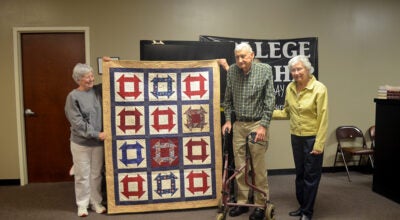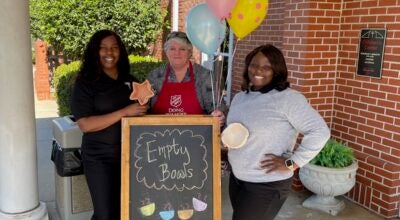Conversations of a different kind
Published 10:00 pm Friday, July 31, 2009
The restaurant was crowded. It was “dumplin’ day at the IGA” so no one noticed or paid any attention to the three Saudi Arabian young men seated in the far corner.
Little did they know that the young men were there to soak in the Southern culture, sample some genuine Southern food and “cipher” the Southern dialect.
Sulton Aloboud, Majed Alothman and Mohammed Alfalfi are students at Troy University and their purpose in being at the restaurant actually had more to do with learning the language than it did with dining on chicken ’n dumplin’s. But what better way to learn a language than around the “kitchen” table where conversation is casual and flows as freely as ribbon cane syrup.
Nathan Kelly of Troy, also a student at Troy University, has befriended the Saudi Arabian young men and meets with them once a week for no reason other than for them to converse together.
“We just sit and talk about a variety of things,” Kelly said. “They want to learn the English language and the best way is through conversation. Other than learning the language, they also learn more about our culture, and I learn more about their culture. So, through our conversations, we all learn.”
Kelly said the conversations are giving him great insight into the Saudi Arabian culture, and he hopes that the conversations are doing the same for his friends.
The lunch buffet they shared provided conversational opportunities different from those at the campus setting.
Kelly pointed out foods with names totally unfamiliar to his Saudi Arabian friends – turnips, rutabagas, butter beans and such. He also made them aware of the foods that were cooked with pork, which is forbidden in the Islam religion.
“Many of the vegetables that we eat in the South are cooked with pork,” Kelly said. “For flavor.”
The difference between the Saudi Arabian students and the regulars at the restaurant was immediately noticeable.
Rather than piling their plates to overflowing, the young men chose to take very liberal servings – actually a small tablespoon was the biggest serving on their plates.
“We don’t often eat in restaurants,” Mohammed said. “We eat in our homes. On special occasions, we might eat at a restaurant. But only special occasions.”
Majed said he might help his wife with the cooking “a little,” but the young men indicated that the gender roles are stricter in Saudi Arabia than in the United States.
“My wife knows all about the kitchen – about cooking and washing,” Mohammed said and added laughing, “I can’t find my way around the kitchen.”
Much of the early conversation among the friends centered on food.
The international students shunned iced tea, preferring hot tea to the signature Southern beverage.
They inquired about the variety of desserts – banana pudding especially.
“We never had that,” the international students said. Although they said they eat fried foods, their diets don’t include the vast amount of fried foods and desserts that are consumed by Americans.
“We’ll go home with big stomachs,” Majed said, laughing.
Mohammed said in Saudi Arabia fruits are the desserts of choice.
“We have fruits at most meals and sometimes with milk and sugar,” he said. “The fruit is often inside a cake and that is very good.”
Kelly reasoned that the Saudi Arabian fruitcake was similar to banana bread.
Majed said dates, which are the oldest fruit, are a large part of Saudi Arabian cuisine culture.
In Saudi Arabia a large variety of breads and pastries are made with dates.
Kelly explained that dates are “foreign” to the South but popular in California.
“But we have a fruit that is similar. It’s called figs,” he said.
The word figs, caused three sets of eyebrows to be raised in question marks.
Kelly explained that a fig is a small, soft sweet fruit shaped like a teardrop.
“My grandfather has a fig tree,” he said. “We’ll go over there, and you can try them.”
The four students continued to explore those food words, and they all perfectly understood the word cheesecake.
Even though the international students had served themselves with only one or two dumplings, they gave them high marks.
“We have something much like this, but we put cheese over it and a bake it in the oven,” Majed said.
Sulton especially liked the corn and cornbread and inquired as to how the cornbread is made.
With “dinner” done and the plates pushed to the side, the conversation moved in other directions.
Majed said he likes Troy because there is “so little traffic.”
“In Saudi Arabia it is hard to go from place to place, but here there is so little traffic,” he said. “I like that.”
From traffic the conversation moved back to women and their roles in Saudi Arabia.
Mohammed said the wearing of veils as mandated by the Islamic religion is not thought to be demeaning to women.
“For us, it is not a negative thing,” he said. “It is a special thing for women. We celebrate our women. We want to keep them pure. Women are respected. If there is a dispute between a man and a woman, the woman’s side is most often taken – because of respect.”
Sulton said he has learned much about the American culture in the months that he has been here. However, he would like to have the experience of living with an American family.
“To know what it’s really like to be American,” he said.
Majed and Mohammed agreed that they, too, would like to be more assimilated into American life and would like to spend more time with the Southerners who, they said, are the friendliest people in the world.
“They smile all the time. All the time and that is so good,” Mohammed said. “In other places in the world, the people have hard faces. Not here. Not in the South.”
Majed and Sulton are at Troy University pursuing MBAs. Mohammed is pursuing a degree in information technology.
“We are here because this is the best place to get an education,” Majed said. And Mohammed added that there is nowhere better to be educated than in the United States.
The students said receiving an education in the United States will better prepare them to deal with anyone around the world.
The international students are in the United States on student visas. Majed and Mohammed have their wives and children with them, and they all are enjoying learning about the United States and all its wonders.
The three young men come from a country with great wealth and a country that has no income tax or sales tax. A country where education is free to all who want it and the government is willing and ready to pay the expenses of those who want to further their educations here in America.
The Saudi Arabian students said they appreciate their homeland and they also have great admiration for the country called America and for the people who smile “even to strangers.”



